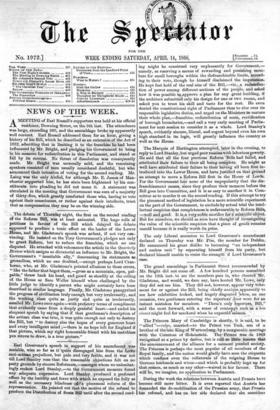Earl Grosvenor's speech in support of his amendment was amiable,
wise so far as it 'quite disengaged him from the Lowe•anti-arthain.prejudices, but pale and very feeble, and it was not
till Lord Stanley rose that the reasonable objections felt on no party grounds by sincere Ref ormers,—amongst whom we unhesitat- ingly reckon Lord Stanley,—to tke Government measure found any adequate expression. Lord Stanley produced a profound effect by the lucidity and force with which he exposed the folly as well as the necessary blindness ea piecemeal reform of the representation. He pointed out that the motive of the refusal to produce the Distribution of Seats Bill until after the second read-
ing might be construed very unpleasantly for G overnment,— namely, as reserving a means of rewarding and punishing mem- bers for small boroughs within the disfranchisable limits, 'accord- ing to their vote, though he himself disclaimed the imputation. He kept fast hold of the real aim of the Bill,—viz., a redistrilm- tion of power among different sections of the people, and asked how it was possible to approve a plan for any great building, if the architect submitted only his design for one or two rooms, and asked you to trust his skill and taste for the rest. He even denied the constitutional right of Parliament thus to slur over its responsible legislative duties, and urged on the Ministers to mature their whole plan,—franchise, redistribution of seats, rectification of borough boundaries,—and call a very early meeting of Parlia- ment for next session to consider it as a whole. Lord Stanley's speech, evidently sincere, liberal, and cogent beyond even his own high standard in its logic, will greatly influence the country as well as the House.






























